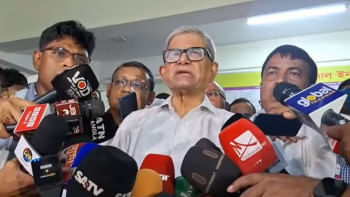Expert Recommendations: Gone mostly unheeded

As Covid-19 cases kept going up in mid-April, the government formed a national technical advisory committee to find ways to prevent the spread of the deadly virus in the country.
The 17-member committee, led by Bangladesh Medical and Dental Council President Dr Mohammad Shahidullah, was also tasked with making recommendations for improving the quality of medical services at hospitals.
Since its formation on April 18, the committee sat nine times and came up with various suggestions and strategies for containing the novel coronavirus.
But most of their suggestions have fallen on deaf ears. In fact, the government appears to have not taken inputs from the technical experts while drawing up its Covid-19 strategy.
Take, for example, the committee's suggestion on lockdown made over a week ago.
The committee, at its ninth meeting on June 10, deemed it necessary to urgently impose a complete lockdown across larger areas based on the number of infected people and the risk of spread of the virus.
"A complete lockdown is necessary to contain the spread of the disease and to ensure social distancing," said a press release issued by the committee.
But the government has so far put two areas in the capital -- East Rajabazar and Wari -- under lockdown since June 10 with severe restrictions.
The committee chief, Dr Mohammad Shahidullah, said the authorities have started implementing some of their recommendations while many remain unaddressed.
"We have made many valuable suggestions. The situation will improve if those are taken into account and implemented, or else the situation would be disastrous," he told The Daily Star.
There will be no respite from virus transmission if the country fails to take the advantage of the proposed zone-based lockdown this time, he noted.
Contacted, Prof Abul Kalam Azad, director general of the Directorate General of Health Services (DGHS), said, "[There is] no point in asking me this... whatever announcement I make as the key person, I need to take permission beforehand from the government as per law."
On the lockdown, he said they will not impose lockdown on a larger scale.
"We do not think many areas will be put under lockdown at the same time," he said.
A few days ago, the Central Technical Group under the DGHS primarily identified 45 areas in the capital as "red zones".
It also put in the "red zone" category 11 areas in Chattogram city, the entire Gazipur district, and several upazilas in Narsingdi and Narayanganj.
But this created confusion among people about when their localities will be put under strict lockdown. As of yesterday, the government was yet to issue any circular with details of the places to be categorised as "red zones".
Asked, Habibur Rahman Khan, additional secretary at the Health Services Division of the health ministry, claimed that they are taking into account the recommendations of the national advisory committee.
"That's why the government is planning to go for [zone-based] lockdown. If they [the committee] ask for a complete lockdown of an entire area, that will be difficult because it will halt economic activities," he told The Daily Star on Sunday.
About the area-wise lockdown, he said, "It is a huge job; multiple ministries are involved here… hopefully, the list of the zones will be announced soon."
However, Habibur had told the committee at its June 4 meeting that they would finalise the list of zones within a week, according to a meeting source.
The additional secretary had also informed the committee that the high-flow oxygen therapy devices would be procured and installed at 39 public hospitals across the country within two weeks, said the source.
But a member of the committee, seeking anonymity, said the devices are yet to be purchased.
"We have been pressing for ensuring oxygen supply [at public hospitals] from the very beginning. But there is hardly any progress…," the member said, adding that the rise in the number of deaths and infections shows that the measures to control virus transmission are not working.
At its June 10 meeting, the committee reminded the health ministry and the DGHS to take steps immediately to procure necessary equipment for providing high-flow oxygen therapy at the public hospitals.
Dr Mohammad Shahidullah said, "We have been saying this from the very beginning, but there has been much progress in this regard."
"Besides, we have said time and again to appoint technologists since many posts are lying vacant. But we don't know why it's being delayed," he said.
Habibur Rahman could not say how long it would take to install the high-flow oxygen therapy at the hospitals.
"Oxygen cylinders are being imported... The local companies are also supplying cylinders," he said.
There are many more instances where recommendations from the national technical advisory committee were not taken into account.
The committee, at its first meeting on April 20, recommended that information on vacancy of hospital beds for Covid-19 patients be put online so that they don't face difficulties in finding beds.
But there is no progress in this regard.
The suggestion on easing shutdown is another glaring example.
On May 28, the committee warned that the number of covid-19 cases would rise unless the requirements for preventing virus transmission are met before easing shutdown.
But the government, apparently desperate to resume business activities, decided to reopen shopping malls, all types of shops and other businesses from May 10 on a limited scale ahead of the Eid-ul-Fitr. A day late, it resumed transport services.
And the country started seeing a steady rise in infections and deaths after the reopening.
Yesterday, the number of coronavirus infections crossed the 100,000-marke with the health directorate confirming 3,803 new cases. The caseload now stood at 102,292.
Thirty-eight deaths from the virus were recorded within 24 hours till yesterday afternoon, taking the death toll to 1,343.
Prof Nazrul Islam, a member of the advisory committee, said, "We don't know whether the recommendations are being implemented or not. You [journalists] better ask the government about it."
"They [government] are saying they are working based on the recommendations from the technical committee. But I assume that [they are not] taking [the recommendations] into consideration."
He warned that the decisions such as reopening of businesses for economic reasons may backfire.
"If transmission continues to rise, the economy will ultimately suffer more," added the virologist.


 For all latest news, follow The Daily Star's Google News channel.
For all latest news, follow The Daily Star's Google News channel. 



Comments